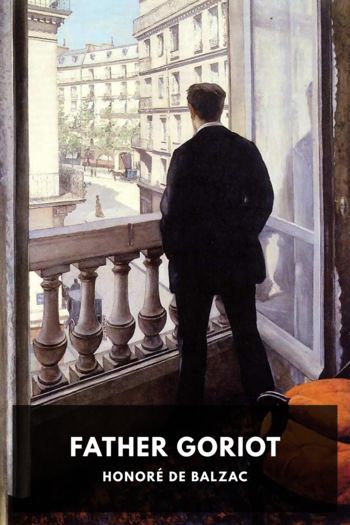Father Goriot, Honoré de Balzac [different e readers .txt] 📗

- Author: Honoré de Balzac
Book online «Father Goriot, Honoré de Balzac [different e readers .txt] 📗». Author Honoré de Balzac
It was about this time when Rastignac was down on his luck and fell into debt, that it became clear to the law student’s mind that he must have some more certain source of income if he meant to live as he had been doing. But while he groaned over the thorny problems of his precarious situation, he felt that he could not bring himself to renounce the pleasures of this extravagant life, and decided that he must continue it at all costs. His dreams of obtaining a fortune appeared more and more chimerical, and the real obstacles grew more formidable. His initiation into the secrets of the Nucingen household had revealed to him that if he were to attempt to use this love affair as a means of mending his fortunes, he must swallow down all sense of decency, and renounce all the generous ideas which redeem the sins of youth. He had chosen this life of apparent splendor, but secretly gnawed by the canker worm of remorse, a life of fleeting pleasure dearly paid for by persistent pain; like Le Distrait of La Bruyère, he had descended so far as to make his bed in a ditch; but (also like Le Distrait) he himself was uncontaminated as yet by the mire that stained his garments.
“So we have killed our mandarin, have we?” said Bianchon one day as they left the dinner table.
“Not yet,” he answered, “but he is at his last gasp.”
The medical student took this for a joke, but it was not a jest. Eugène had dined in the house that night for the first time for a long while, and had looked thoughtful during the meal. He had taken his place beside Mlle. Taillefer, and stayed through the dessert, giving his neighbor an expressive glance from time to time. A few of the boarders discussed the walnuts at the table, and others walked about the room, still taking part in the conversation which had begun among them. People usually went when they chose; the amount of time that they lingered being determined by the amount of interest that the conversation possessed for them, or by the difficulty of the process of digestion. In wintertime the room was seldom empty before eight o’clock, when the four women had it all to themselves, and made up for the silence previously imposed upon them by the preponderating masculine element. This evening Vautrin had noticed Eugène’s abstractedness, and stayed in the room, though he had seemed to be in a hurry to finish his dinner and go. All through the talk afterwards he had kept out of the sight of the law student, who quite believed that Vautrin had left the room. He now took up his position cunningly in the sitting-room instead of going when the last boarders went. He had fathomed the young man’s thoughts, and felt that a crisis was at hand. Rastignac was, in fact, in a dilemma, which many another young man must have known.
Mme. de Nucingen might love him, or might merely be playing with him, but in either case Rastignac had been made to experience all the alternations of hope and despair of genuine passion, and all the diplomatic arts of a Parisienne had been employed on him. After compromising herself by continually appearing in public with Mme. de Beauséant’s cousin she still hesitated, and would not give him the lover’s privileges which he appeared to enjoy. For a whole month she had so wrought on his senses, that at last she had made an impression on his heart. If in the earliest days the student had fancied himself to be master, Mme. de Nucingen had since become the stronger of the two, for she had skilfully roused and played upon every instinct, good or bad, in the two or three men comprised in a young student in Paris. This was not the result of deep design on her part, nor was she playing a part, for women are in a manner true to themselves even through their grossest deceit,





Comments (0)